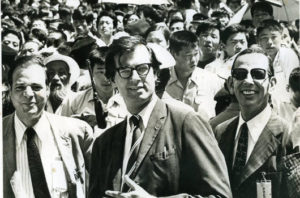Special to WorldTribune.com
 By Donald Kirk
By Donald Kirk
The late Don Oberdorfer would surely have had qualms with the award named for him and presented by U.S. Ambassador Mark Lippert to Noh Hyo-dong, the longtime diplomatic and Washington correspondent for Yonhap News Agency.
Why would a top U.S. diplomat be handing out a prize in the name of someone who spent years covering U.S. diplomats in Washington and overseas?
Who chose the first recipient of this award? What about separation of church and state ― or rather that of the fourth estate from the powers the media ideally should observe with preternatural skepticism?

For all such questions, the awards ceremony Tuesday at the American Center by the sprawling Yongsan Garrison in central Seoul was tasteful and pleasant. The ambassador honored the memory of Don, who died last year, in words that no one would dispute. In decades as a correspondent, initially for the Knight newspapers and then for 25 or so years for the Washington Post, Oberdorfer won a reputation as fair and balanced ― a wise and perceptive journalist who listened to all sides and reported and analyzed what he saw and heard more fairly and thoroughly than the run of his competitors. The words of praise by the ambassador and then by high-level foreign ministry people testified to the admiration that Don inspired when he wrote about Korea on visits to Seoul from his base in Tokyo in the late 1970s. I had known Don ever since he came to Vietnam to cover the 1968 lunar new year Tet Offensive for the Knight newspapers. Then with the old Washington Star, I got to know him better a few years later when we arrived in Japan ― he with the Washington Post and I with the Chicago Tribune.
A decade ago, Don responded at once to my request for an article by him for “Korea Witness,” a book by and about journalists covering Korea, that I co-edited with Choe Sang-Hun for the 50th anniversary of the Seoul Foreign Correspondents’ Club. Don wrote colorfully of the North-South Red Cross talks that I had also covered in September 1972 on my first trip to Korea.
From what I knew of Don, he would have been a little embarrassed by the encomiums from diplomats to whom he might not have wanted to be personally close. No journalists, other than Noh Hyo-Dong, his boss at Yonhap and I, were there. I attended to recapture memories of one whom I had encountered at odd intervals for years.
Long after he had published his authoritative “The Two Koreas,” Don invited me for coffee in Politics and Prose, a bookstore in Washington. He told me he had cited my earlier book on Chung Ju-Yung, founder of the Hyundai empire, and encouraged me in a book I wanted to write on Kim Dae-Jung and his dealings with North Korea. After the book, “Korea Betrayed: Kim Dae Jung and Sunshine,” was published, I saw him for the last time at a talk hosted by Victor Cha that I gave at the Center for Strategic and International Studies in D.C.
At the talk Don asked me if I thought Bill Clinton, in his final month as president in January 2000, had really wanted to go to Pyongyang in hopes of a breakthrough that would be a legacy of his presidency. The infamous “recount” in which George W. Bush carried Florida, wresting victory as Clinton’s successor Vice President Al Gore, wound up dashing hopes of a Clinton-Kim summit ― and some believed of a real deal.
I responded that I didn’t think Clinton would have gone to Pyongyang knowing Kim Jong-Il would not come to terms on his nuclear program. Don said he believed Clinton would have loved the chance.
Indeed, in August 2009, two weeks before DJ’s death, Clinton had flown to Pyongyang on an “unofficial” mission to pick up correspondents Euna Lee and Laura Ling of Al Gore’s Current TV network ― they’d been captured by North Korean guards along the North’s Tumen River border with China. In retrospect, I realize Don was absolutely right. Clinton had been delighted to meet North Korea’s “dear leader” for a three-hour luncheon
Ever modest, soft spoken, polite, Don was always open to views and ideas. His lawyer son Daniel, invited with his wife from Minneapolis, was pleased to see his father so honored.
But what Don would have thought of the sponsorship of the event is another matter. It might seem churlish to suggest Ambassador Lippert, who takes credit for instituting a “Don Oberdorfer award,” set it up as a way of gaining pro-American publicity. The occasion, however, inspired questions.
Would Don have been happy being remembered by a prize that’s not likely to go to a serious critic of U.S. or Korean policy? Don in his journalism was above the fray. How would he have felt about his legacy morphing into a policy goal that he might in real life have analyzed but never endorsed?
Just asking.
Donald Kirk, journalist and author, has been covering East Asia for decades. He’s at kirkdon4343@gmail.com.
